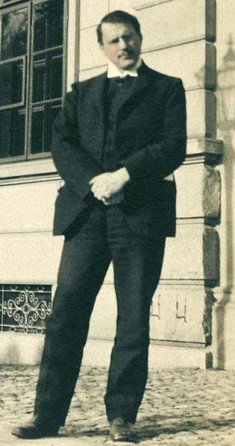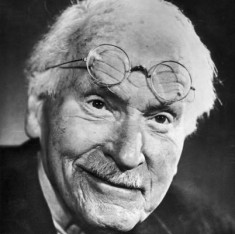| Carl Jung | |
|---|---|
 |
|
| Psychologist | |
| Born | July 26, 1875 Kesswil, Thurgau, Switzerland |
| Died | June 6, 1961 (at age 85) Küsnacht, Zurich, Switzerland |
| Nationality | Swiss |
Carl Gustav Jung is often considered among the top three most important and influential psychologists in history. His theory of archetypes and study of the collective unconscious remain two of the most revolutionary and influential discoveries in the discipline of psychology. To this very day, his research and life’s work remain areas of critical study in all university psychology programs. He is widely considered the father of analytical psychology.
Jung’s Early Years
Carl Jung was born on July 26, 1875, in Kesswil, Switzerland. He was the fourth child his parents bore and was the only one that survived. His mother was from a wealthy family and his father was a pastor in the Swiss Reformed Church.
Jung’s home life was not a very positive one. His mother suffered from mental illness problems and would frequently lock herself in her room where she claimed she could converse with spirits. This had a negative effect on young Carl who began to believe that he suffered from a split personality. This could also have played a role in the decision of Carl Jung to become a psychologist later in life.
Educational Years
During the later years at his time at the Humanistisches Gymnasium, Jung suffered an incident with a bully that led to him suffering from fainting whenever he would do schoolwork. Once it became obvious to him he would forever live a life of poverty if he did not actually take his studies seriously, Jung began his pursuit of academic excellence.
Jung eventually enrolled in the medical program at the University of Basel, but he did not take up the study of psychiatry. The reason is the study of psychiatry and mental health was not considered a serious area of discipline. This may have been due in large part to the very negative sentiments society had towards the mentally ill and disturbed circa 1895.
Jung discovered a textbook on the subject of psychiatry and this did fascinate him immensely. In 1900, he took a job at a psychiatric hospital in Zurich. Shortly thereafter, he published a very interesting dissertation entitled On the Psychology and Pathology of So-Called Occult Phenomena and later went on to publish Studies in Word Association, which aided in establishing his credentials as someone with a brilliant mind for psychology.
Jung’s Professional Career
Jung served as the editor of the Yearbook for Psychoanalytical and Psychopathological Research and went on to become Chairman for Life of the International Psychoanalytical Association in 1910. During this time, he began work on Psychology of the Unconscious.
Tensions in Europe grew and the First World War broke out. After a stint in the army in World War I where he served as a doctor treating British soldiers, Jung married Emma Rauschenbach. They remained married until her passing in 1955. After his service in World War I, Jung invested a significant amount of time in professional and educational pursuits. He also showed some serious signs of post traumatic stress disorder based on his wartime experiences.
Jungian Psychology
 Based on his work and experience, Jung founded a new school of psychology known as analytical psychology. The goal of this approach to psychology is to aid someone to find meaning in life and be able to contribute better to it. Psychological problems are rooted out at their core through therapy and uncovering what exists beneath the surface in the unconscious mind.
Based on his work and experience, Jung founded a new school of psychology known as analytical psychology. The goal of this approach to psychology is to aid someone to find meaning in life and be able to contribute better to it. Psychological problems are rooted out at their core through therapy and uncovering what exists beneath the surface in the unconscious mind.
In 1919, Jung established his theory of archetypes, or patterns that a person procures from the collective unconscious. The collective unconscious was another brilliant Jungian observation and it refers to how the mind organizes its experiences from the experiences of a person’s ancestors and surroundings.
Both archetypes and the collective unconscious can have a dramatic effect on a person’s psyche regardless of whether or not the person even realizes it. This collective unconscious is not empirical in nature, but is inherited in a manner similar to DNA.
Ultimately, the goal of the Jungian approach to psychology is to help a person experience self-realization and become a better, more productive, and healthier person.
Death and Legacy
Carl Jung passed away on June 6, 1961, in Küsnacht, Switzerland.
Along with Sigmund Freud, Jung was influential on the world of psychology. His contributions and theories are still discussed and utilized in the field of psychology today.